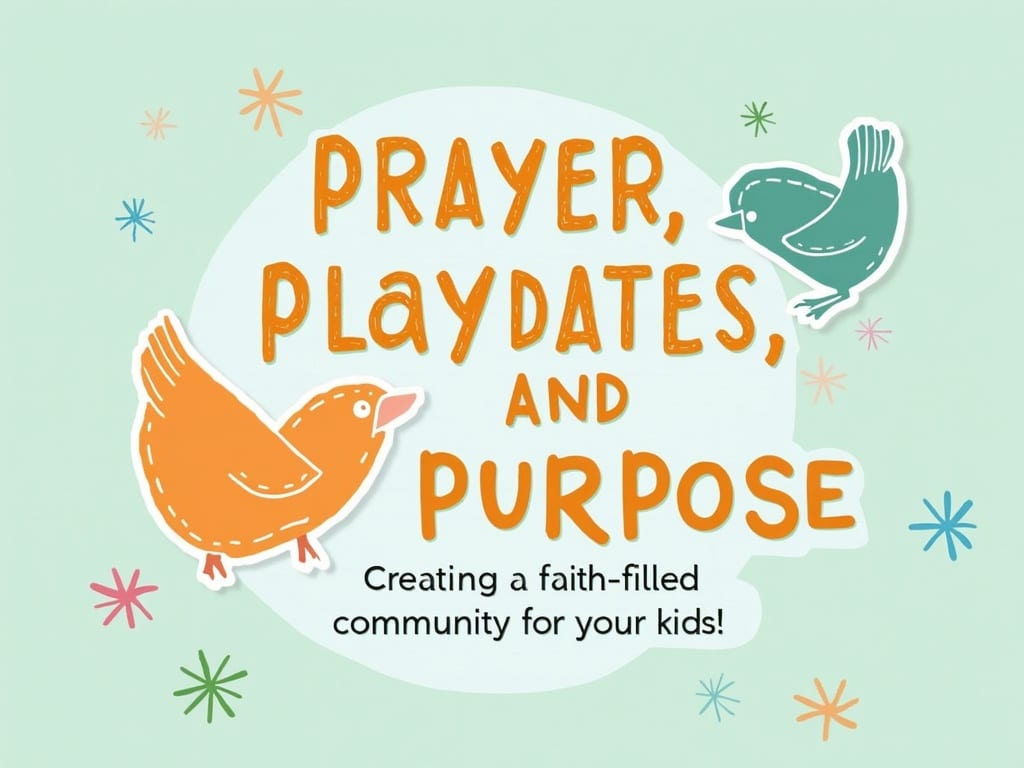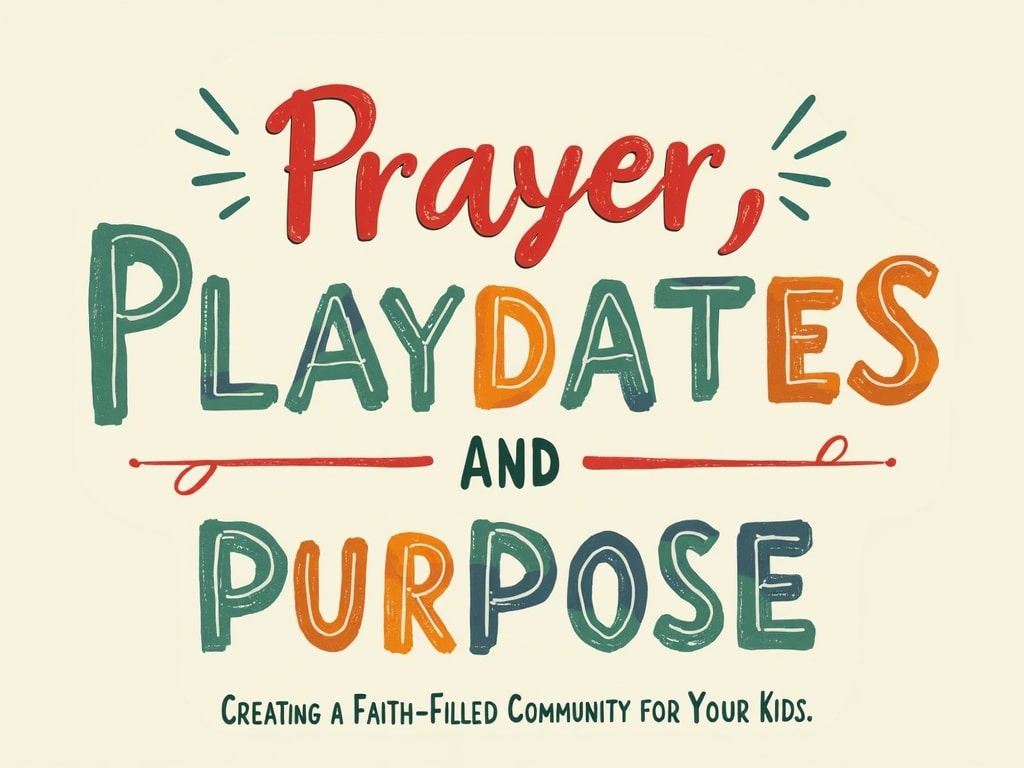Prayer, Playdates, and Purpose: Creating a Faith-Filled Community for Your Kids
Introduction: Weaving Faith into the Fabric of Childhood
Imagine a childhood brimming with laughter, friendship, and a deep-rooted understanding of faith. It's a beautiful vision, isn't it? As Christian parents, we yearn to provide our children with a nurturing environment where their faith can blossom. But nurturing a vibrant faith isn't merely about Sunday school or bedtime prayers; it's about intentionally weaving faith into the very fabric of our children's lives, creating a supportive community where their spirits can soar. This means creating a community based around faith-based education resources that will build a strong foundation that will continue to be built upon their entire lives.
This article will explore practical ways to build that community – a community of prayer, playdates, and purpose – that will help your children develop a lifelong, meaningful relationship with God. Let's embark on this journey together!
Defining a Faith-Filled Community: More Than Just Words
What exactly does a genuinely faith-filled community look like for children? It’s more than just attending church services or saying grace before meals. It's about creating a culture of love, acceptance, and spiritual growth that permeates every aspect of their lives. Key elements include:
- Shared Values: A commitment to living according to biblical principles, demonstrating compassion, honesty, and kindness.
- Open Dialogue: Creating a safe space for children to ask questions, express doubts, and explore their faith without fear of judgment.
- Mutual Support: A network of friends and families who encourage one another in their faith journeys.
- Active Engagement: Opportunities to serve others, participate in meaningful activities, and put their faith into action.
It’s about creating an environment where faith isn't just taught but lived, felt, and experienced every day.
The Power of Prayer: A Lifeline to God
Prayer is the cornerstone of a vibrant faith. How can we cultivate a consistent prayer life with our children? Start early, and make it a natural part of their day.
- Morning Prayers: Begin the day by thanking God for blessings and asking for guidance.
- Mealtime Prayers: Express gratitude for the food and the people sharing the meal.
- Bedtime Prayers: Reflect on the day, offer thanks, and ask for protection during the night.
Teach children that prayer is a conversation with God – a time to share joys, anxieties, and needs. Use simple, age-appropriate language. Encourage them to pray for others – family, friends, those in need. The benefits of cultivating a prayer life are immense: a sense of peace, connection to God, and development of empathy and compassion.
Playdates with a Purpose: Nurturing Faith Through Friendship
Playdates aren't just about fun and games; they can be intentional opportunities to nurture faith. How? Consider these ideas:
- Choose Friends Wisely: Seek out families who share similar values and a commitment to faith.
- Incorporate Faith-Based Activities: Read Bible stories aloud, sing worship songs, or create artwork inspired by biblical themes.
- Discuss Values: Incorporate conversations about kindness, forgiveness, and helping others into their playtime.
- Pray Together: End the playdate with a simple prayer of gratitude.
By intentionally incorporating faith into playdates, you create a supportive environment where children can learn, grow, and strengthen their faith alongside their friends.
Serving Together: Putting Faith into Action
Faith isn't just about believing; it's about doing. Serving others is an essential component of faith development for children. It teaches them compassion, empathy, and the importance of using their gifts to make a difference.
Practical ways families can serve:
- Volunteer at a Local Food Bank: Help pack and distribute food to those in need.
- Visit a Nursing Home: Spend time with residents, sharing stories and spreading cheer.
- Participate in Church Outreach Programs: Help with community events, fundraisers, or service projects.
- Offer Help to Neighbors: Rake leaves, shovel snow, or run errands for elderly or disabled neighbors.
Involve your children in the planning and execution of service projects. Let them see the impact their actions have on others. This will instill in them a lifelong commitment to serving and making a difference in the world.
Faith-Based Education Resources: Building a Foundation
Numerous faith-based education resources are available to support parents in nurturing their children's faith.
- Age-Appropriate Bibles: Choose Bibles that are easy for children to understand and engage with.
- Bible Storybooks: Bring biblical stories to life with colorful illustrations and engaging narratives.
- Devotionals: Use daily devotionals to encourage regular prayer and reflection.
- Christian Music and Movies: Surround your children with positive, uplifting media that reinforces faith values.
Look for teachable moments in everyday life. Use current events, nature, or personal experiences to illustrate biblical principles and spark conversations about faith. Use resources such as Bible stories in a chronological order to fully understand the timeline and story of the Bible.
Overcoming Challenges: Staying the Course
Building a faith-filled community isn't always easy. Parents often face challenges such as time constraints, differing opinions among family members, and the influence of secular culture.

Here are some strategies for overcoming these challenges:
- Prioritize Faith Activities: Make time for prayer, church attendance, and service projects, even when life gets busy.
- Communicate Openly: Discuss your values and expectations with your children. Listen to their concerns and address their questions honestly.
- Seek Support: Connect with other Christian families for encouragement and accountability.
- Be Patient: Remember that faith development is a lifelong journey. Don't get discouraged by setbacks.
Remember that even small steps can make a big difference. Stay committed to your goal, and trust that God will guide you along the way.
The Role of the Church: A Vital Support System
The church community plays a vital role in supporting faith development. It provides a sense of belonging, opportunities for spiritual growth, and a network of supportive relationships.
When choosing a church, look for:
- Engaging Children's Ministry: A church that offers age-appropriate programs and activities for children.
- Strong Biblical Teaching: A church that emphasizes sound doctrine and encourages spiritual growth.
- Community Outreach: A church that is actively involved in serving the local community.
- Welcoming Atmosphere: A church where your family feels accepted and valued.
Get involved in church activities, and encourage your children to participate in programs designed for their age group. The church can be a powerful source of encouragement and support for your family's faith journey.
Modeling Authentic Faith: Actions Speak Louder Than Words
Perhaps the most crucial element in creating a faith-filled community is modeling authentic faith in your own life. Children learn by observing their parents' actions and attitudes.
Be a positive example by:
- Practicing what you preach: Live according to biblical principles in your daily life.
- Being honest about your struggles: Admit your mistakes and seek forgiveness.
- Demonstrating compassion and kindness: Treat others with respect and empathy.
- Maintaining a consistent prayer life: Let your children see you praying regularly.
Your genuine faith will have a profound impact on your children. They will see that faith is not just a set of rules but a way of life that brings joy, peace, and purpose.
Creating Family Traditions: Building Lasting Memories
Family traditions can be powerful tools for instilling faith values. They create lasting memories and provide opportunities to reinforce important lessons.
Creative and meaningful traditions to adopt:
- Advent Calendar: Count down to Christmas with daily Bible readings and activities.
- Thanksgiving Gratitude Jar: Write down things you are thankful for each day in November, and read them aloud on Thanksgiving.
- Birthday Blessings: Write notes of appreciation and prayers for the birthday person.
- Weekly Family Bible Study: Set aside time each week to read and discuss the Bible together.
Tailor your traditions to your family's interests and values. The key is to create meaningful experiences that will deepen your family's connection to one another and to God.
Nurturing a Lifelong Journey: A Faith That Endures
Ultimately, our goal as parents is to help our children develop a lifelong faith that is personal and meaningful. This means nurturing their spiritual growth, encouraging them to ask questions, and providing them with the tools they need to explore their faith independently.
Here's how to nurture a vibrant, enduring faith:
- Encourage Critical Thinking: Help your children analyze and evaluate different viewpoints on faith-related issues.
- Promote Spiritual Disciplines: Encourage them to engage in prayer, Bible study, and service, even when they are busy or facing challenges.
- Support Their Faith Journey: Be a source of encouragement and support as they navigate the complexities of faith.
- Trust God's Guidance: Trust that God will guide your children on their faith journey, even when you don't understand their choices.
A vibrant faith is one that is alive, growing, and constantly evolving. It's a faith that shapes their character, guides their decisions, and inspires them to live a life of purpose and meaning.
Conclusion: A Legacy of Faith
Creating a faith-filled community for your children is an investment that will yield eternal rewards. It's about intentionally weaving faith into every aspect of their lives – through prayer, playdates, service, and family traditions. It's about modeling authentic faith and providing them with the resources and support they need to develop a lifelong, meaningful relationship with God. By creating this community, you're not just raising children; you're building a legacy of faith that will impact generations to come. So, embrace the journey, trust in God's grace, and watch your children's faith blossom and grow!

